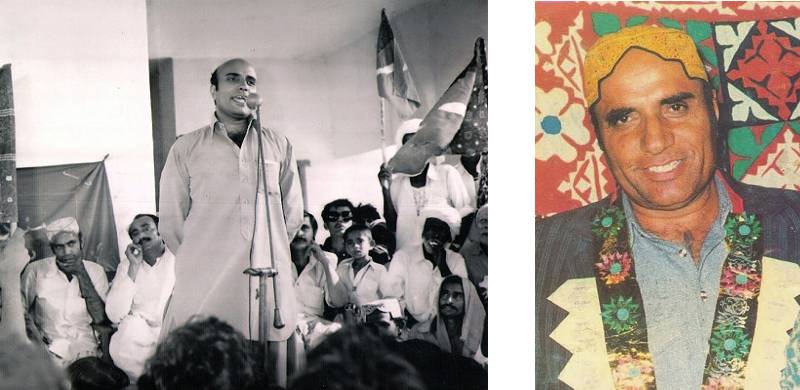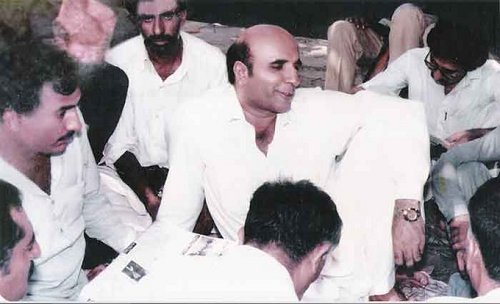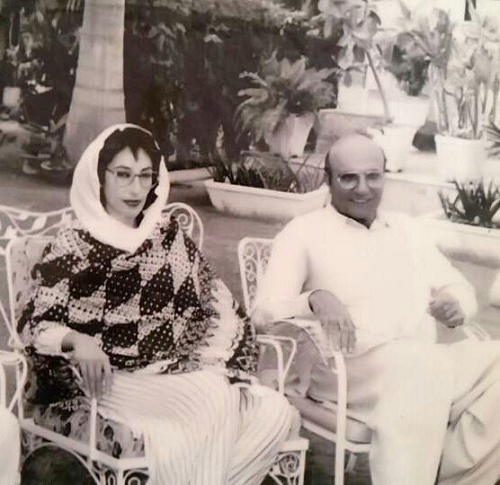
It is a well-settled principle of human history that rapid change can only be brought through sustained struggle, sacrifices and more importantly loyalty to the people who are going to be the beneficiaries of that change. By the passage of time, that sustained struggle coupled with the two elements i.e. sacrifice and loyalty, eventually transforms into revolution.
In Sindh, post-independence, Shaheed Fazil Rahu of Badin is perceived as an eminent revolutionist and is idealised as a true proponent of peasants’ rights after the legendary Comrade Hyder Bux Jatoi. The charm of his personality continues to motivate the people even after 36 years of his assassination.
The death anniversary of eminent nationalist, peasants’ leader and political activist Fazil Rahu was observed last week on the 17th of January. Various events were scheduled to be held across Sindh to pay glowing homage to the iconic leader for his relentless struggle for the rights of deprived class of Sindh.
He became a poisonous pill to swallow for the feudal lords of Sindh who wanted to usurp the due rights of peasants. Besides that, he would roar like a lion during his speeches against the dictators who sabotaged democratic process in the country on different occasions.
Fazil’s political life was spread over three decades; there were many movements when he stood out as the sole force of resistance. Essays, books and memories that his comrades have written following his assassination shed light on his political career. Gen Ayub, Gen Yahya, Bhutto and Gen Zia all put him behind bars for several years for his political struggle.
Mohammad Fazil Rahu was born in 1934 in Rahuki, a small town of Badin district, in the house of the local landowner Ahmed Khan Rahu. Rahu could not study much but was well aware of the sociopolitical situation of his era and his deep understanding led his to the ranks of dynamic leaders of Sindh along with Hyder Bux Jatoi and Rasool Bux Palijo.
Fazil Rahu had started his pro-democratic struggle from the era of General Ayub Khan with a political career that was built more by his political acumen and true commitment towards serving the downtrodden people of Sindh.
He announced to support Quaid’s sister Ms Fatima Jinnah when she was contesting presidential elections against Ayub. Young Fazil campaigned for Fatima Jinnah and posed opposed local feudal lords supporting the undemocratic approach of Ayub Khan.
 Fazil Rahu represented a true grassroots people’s movement. Any 20th century history of the people’s movement in Sindh would be incomplete without highlighting his role and sacrifices and determination. Despite belonging to a small landlord family, he disowned his own landowner class, and associated, led and sacrificed for the peasant class. It was Rasool Bux Palijo who took Fazil to the orbit of national level politics and they went on to become founding members of Awami National Party.
Fazil Rahu represented a true grassroots people’s movement. Any 20th century history of the people’s movement in Sindh would be incomplete without highlighting his role and sacrifices and determination. Despite belonging to a small landlord family, he disowned his own landowner class, and associated, led and sacrificed for the peasant class. It was Rasool Bux Palijo who took Fazil to the orbit of national level politics and they went on to become founding members of Awami National Party.
After Haider Bux Jatoi, Fazil was the second socialist leader who not only had an understanding of the class character of society, but who worked to liberate the peasantry and unite them. During the 1977 elections, despite being in prison, Fazil decided to contest elections. Z A Bhutto had organized most local lords under the banner of his party, the PPP.
The jail superintendent and the returning officer both tried to delay and deny Fazil’s submission of his electoral nomination form, but thousands of his supporters made their way and staged a sit-in outside the returning officer’s office, forcing him to accept the nomination. Fazil was contesting the election on the platform of the Sindh Hari Committee.
Fazil’s popular election campaign at a time when the PPP was prime caused panic in the ranks of local landlords, pirs and influential elements. They saw it as the peasantry's revolt against them. The man behind the bars lost the elections, but the worst was yet to come when Gen Zia took power.
Rahu along with his political ally and cordial friend Rasool Bux Palijo led movements, against formation of One Unit, Imposing of Martial Law on 5 July 1977 and movement for publication of voter list in Sindhi. Fazil was champion of women rights and encouraged women of remote villages of Sindh to take part in politics and rights movement.
He along with his other family members including his daughter faced political victimisation at different times by anti-democratic forces for vividly advocating the rights of peasants.
The crusader of revolution in Sindh Fazil Rahu was assassinated by a shepherd who attacked him with an axe when he was getting ready to address a gathering in Gholarchi town of district Badin. The news of his tragic death was aired from BBC and other news sources. The message that he left behind will keep encouraging the people of Sindh for sustained struggle to achieve their rights.
In Sindh, post-independence, Shaheed Fazil Rahu of Badin is perceived as an eminent revolutionist and is idealised as a true proponent of peasants’ rights after the legendary Comrade Hyder Bux Jatoi. The charm of his personality continues to motivate the people even after 36 years of his assassination.
The death anniversary of eminent nationalist, peasants’ leader and political activist Fazil Rahu was observed last week on the 17th of January. Various events were scheduled to be held across Sindh to pay glowing homage to the iconic leader for his relentless struggle for the rights of deprived class of Sindh.

He became a poisonous pill to swallow for the feudal lords of Sindh who wanted to usurp the due rights of peasants. Besides that, he would roar like a lion during his speeches against the dictators who sabotaged democratic process in the country on different occasions.
Fazil’s political life was spread over three decades; there were many movements when he stood out as the sole force of resistance. Essays, books and memories that his comrades have written following his assassination shed light on his political career. Gen Ayub, Gen Yahya, Bhutto and Gen Zia all put him behind bars for several years for his political struggle.
Mohammad Fazil Rahu was born in 1934 in Rahuki, a small town of Badin district, in the house of the local landowner Ahmed Khan Rahu. Rahu could not study much but was well aware of the sociopolitical situation of his era and his deep understanding led his to the ranks of dynamic leaders of Sindh along with Hyder Bux Jatoi and Rasool Bux Palijo.
Fazil Rahu had started his pro-democratic struggle from the era of General Ayub Khan with a political career that was built more by his political acumen and true commitment towards serving the downtrodden people of Sindh.
He announced to support Quaid’s sister Ms Fatima Jinnah when she was contesting presidential elections against Ayub. Young Fazil campaigned for Fatima Jinnah and posed opposed local feudal lords supporting the undemocratic approach of Ayub Khan.
 Fazil Rahu represented a true grassroots people’s movement. Any 20th century history of the people’s movement in Sindh would be incomplete without highlighting his role and sacrifices and determination. Despite belonging to a small landlord family, he disowned his own landowner class, and associated, led and sacrificed for the peasant class. It was Rasool Bux Palijo who took Fazil to the orbit of national level politics and they went on to become founding members of Awami National Party.
Fazil Rahu represented a true grassroots people’s movement. Any 20th century history of the people’s movement in Sindh would be incomplete without highlighting his role and sacrifices and determination. Despite belonging to a small landlord family, he disowned his own landowner class, and associated, led and sacrificed for the peasant class. It was Rasool Bux Palijo who took Fazil to the orbit of national level politics and they went on to become founding members of Awami National Party.After Haider Bux Jatoi, Fazil was the second socialist leader who not only had an understanding of the class character of society, but who worked to liberate the peasantry and unite them. During the 1977 elections, despite being in prison, Fazil decided to contest elections. Z A Bhutto had organized most local lords under the banner of his party, the PPP.
The jail superintendent and the returning officer both tried to delay and deny Fazil’s submission of his electoral nomination form, but thousands of his supporters made their way and staged a sit-in outside the returning officer’s office, forcing him to accept the nomination. Fazil was contesting the election on the platform of the Sindh Hari Committee.
Fazil’s popular election campaign at a time when the PPP was prime caused panic in the ranks of local landlords, pirs and influential elements. They saw it as the peasantry's revolt against them. The man behind the bars lost the elections, but the worst was yet to come when Gen Zia took power.
Rahu along with his political ally and cordial friend Rasool Bux Palijo led movements, against formation of One Unit, Imposing of Martial Law on 5 July 1977 and movement for publication of voter list in Sindhi. Fazil was champion of women rights and encouraged women of remote villages of Sindh to take part in politics and rights movement.
He along with his other family members including his daughter faced political victimisation at different times by anti-democratic forces for vividly advocating the rights of peasants.
The crusader of revolution in Sindh Fazil Rahu was assassinated by a shepherd who attacked him with an axe when he was getting ready to address a gathering in Gholarchi town of district Badin. The news of his tragic death was aired from BBC and other news sources. The message that he left behind will keep encouraging the people of Sindh for sustained struggle to achieve their rights.

